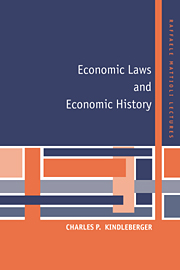Gresham's Law
Published online by Cambridge University Press: 26 October 2009
Summary
Introduction
Once again in this lecture I am going to give the name of a “law” to something that is miscalled. Gresham's law – that bad money drives good money out of circulation – is misnamed because the empirical uniformity was not discovered by Gresham at all. It was wrongly attributed to him in 1857 by Henry D. McLeod. Raymond de Roover tells us that the principle was already well known in 1550, having been stated by Nicolaus Copernicus in his essay on coinage of 1525. Louis Wolowski traces the idea back to Nicholas Oresme, Bishop of Lisieux in France, who wrote De Moneta in 1360 or so, attacking monetary debasement and asserting that the king had no right to change the weight or fineness of coins, or the bimetallic ratio. An obscure British writer, Humphrey Holt, complained in 1551 that debased coins were driving good heavy coins abroad and pushing up prices. This was the year in which Sir Thomas Gresham went to Antwerp as a private merchant and royal factor, or financial agent of the Crown, paying out the service of old debts, buying ordnance against new, and handling specie payments. As is so often the case, the rich, prominent man gets the credit for well-known theories devised by others.
It is of course too late to change the appellation of Gresham's law to the Oresme, the Copernican or the Holt law.
- Type
- Chapter
- Information
- Economic Laws and Economic History , pp. 43 - 66Publisher: Cambridge University PressPrint publication year: 1990



